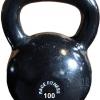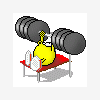
testosteron
Napisano Ponad rok temu
Napisano Ponad rok temu
Osobiscie polecam deke firmy Eurochem flakon 10ml 200mg/ml cena koło 180zl wychodzi z tego 10 strzałow. do tego testosteron enanthate firmy aburaihan 1 amp co 5 dni przez 11 tygodni i masz cyklon.
łykasz to?
Napisano Ponad rok temu
testosteron enanthate
i ile kosztuje za 5 ampułek
Napisano Ponad rok temu
kosztuje okolo 15 zlotych za ampolke
Napisano Ponad rok temu
no to kupie te 10 ml deki.. i do tego te 16 ml teścia...
? ok?
Napisano Ponad rok temu
Napisano Ponad rok temu
Napisano Ponad rok temu
łykasz to?
Napisano Ponad rok temu
Napisano Ponad rok temu
Mówcie mi Urban
Napisano Ponad rok temu
łykasz to?
Napisano Ponad rok temu
Napisano Ponad rok temu
[ Dodano: 26-08-2005, 10:58 ]
Absorpcja Kreatyny do komórek zachodzi poprzez transportery kreatynowe (CrT tudzież CreaT), sodo-zależne (2Na+/1 cząsteczka Cr) których poziom zależy od poziomu nasycenia komórki kreatyną. Im komórka bardziej wysycona, tym tych transporterów mniej, tym mniej Kreatyny jest pobierane. Nigdy jednak nie dochodzi do sytuacji, w której Kreatyna w ogóle nie zostaje pobierana. Pobór znacznie zmniejsza się już po wysyceniu, do poziomu 0.03g/kg, bo tyle właśnie organizm dziennie wydala. Wtedy nie ważne, czy bierzemy 5, 10 czy 15g dziennie. Większość znajdziemy w moczu. Wystarczająca dawka w tym stanie to właśnie 0.03g/kg. Czy ciągła suplementacja kreatyną jest "nieekonomiczna, nieopłacalna"? Jeśli słuchamy porad wyssanych z palca, typu 2x 5g dziennie, to tak. Jeśli natomiast podejdziemy do tego rozsądnie, dawkowanie oparte na fizjologi człowieka, Kreatyna staje się tania jak barszcz.
PS. Dla tych co wierzą w te magiczne przerwy - po odstawieniu Kreatyny, jej poziom w komórkach powraca do normy już po 4 tygodniac.
Wysycenie komórek następuje po ok ~100g
[ Dodano: 26-08-2005, 10:59 ]
Badanie potwierdzające efektywność 10 tygodniowej suplementacji Cr:
J. Appl. Physiol napisał(a):
Long-term creatine intake is beneficial to muscle performance during resistance training
K. Vandenberghe, M. Goris, P. Van Hecke, M. Van Leemputte, L. Vangerve, and P. Hespel.
1 Department of Kinesiology, Faculty of Physical Education and Physiotherapy, and 2 Biomedical Nuclear Magnetic Resonance Unit, Department of Radiology, Faculty of Medicine, Katholieke Universiteit Leuven; and 3 Department Rega School, Katholieke Hogeschool Leuven, B-3001 Leuven, Belgium
Received 13 March 1997; accepted in final form 30 July 1997.
The effects of oral creatine supplementation on muscle phosphocreatine (PCr) concentration, muscle strength, and body composition were investigated in young female volunteers (n = 19) during 10 wk of resistance training (3 h/wk). Compared with placebo, 4 days of high-dose creatine intake (20 g/day) increased (P < 0.05) muscle PCr concentration by 6%. Thereafter, this increase was maintained during 10 wk of training associated with low-dose creatine intake (5 g/day). Compared with placebo, maximal strength of the muscle groups trained, maximal intermittent exercise capacity of the arm flexors, and fat-free mass were increased 20-25, 10-25, and 60% more (P < 0.05), respectively, during creatine supplementation. Muscle PCr and strength, intermittent exercise capacity, and fat-free mass subsequently remained at a higher level in the creatine group than in the placebo group during 10 wk of detraining while low-dose creatine was continued. Finally, on cessation of creatine intake, muscle PCr in the creatine group returned to normal within 4 wk. It is concluded that long-term creatine supplementation enhances the progress of muscle strength during resistance training in sedentary females.
Zwiększony poziom fosforanu Kreatyny (PCr) w komórkach pozostał na zwiększonym poziomie przez okres 10 tygodni, stosując niewielkie dawki 5g/dzień.
Badanie potwierdzające wysoką efektywność 12 tygodniowej suplementacji Cr:
Med Sci Sports Exerc napisał(a):
Title: Performance and muscle fiber adaptations to creatine supplementation and heavy resistance training.
Researchers: Volek JS, Duncan ND, Mazzetti SA, Staron RS, Putukian M, Gomez AL, Pearson DR, Fink WJ, Kraemer WJ.
Institution: Department of Kinesiology/Center for Sports Medicine, The Pennsylvania State University, University Park 16802, USA. Source: Med Sci Sports Exerc 1999 Aug;31:1147-56 Related Articles, Books, LinkOut
Summary: The purpose of this study was to examine the effect of creatine supplementation in conjunction with resistance training on muscle fiber hypertrophy and muscle creatine accumulation.
Methods: Nineteen healthy resistance-trained men were matched and then randomly assigned in a double-blind fashion to either a creatine or placebo group. Periodized heavy resistance training was performed for 12 wk. Creatine or placebo capsules were consumed (25 g x d(-1)) for 1 wk followed by a maintenance dose (5 g x d(-1)) for the remainder of the training period.
Results: After 12 wk, significant increases in body mass and fat-free mass were greater in creatine (6.3% and 6.3%, respectively) than placebo (3.6% and 3.1%, respectively) subjects. After 12 wk, increases in bench press and squat were greater in creatine (24% and 32%, respectively) than placebo (16% and 24%, respectively) subjects. Compared with placebo subjects, creatine subjects demonstrated significantly greater increases in Type I (35% vs 11%), IIA (36% vs 15%), and IIAB (35% vs 6%) muscle fiber cross-sectional areas. Muscle total creatine concentrations were unchanged in placebo subjects. Muscle creatine was significantly elevated after 1 wk in creatine subjects (22%), and values remained significantly greater than placebo subjects after 12 wk. Average volume lifted in the bench press during training was significantly greater in creatine subjects during weeks 5-8. No negative side effects to the supplementation were reported.
Conclusion: Creatine supplementation enhanced fat-free mass, physical performance, and muscle morphology in response to heavy resistance training.
Fragment podkreślony - stężenie Kreatyny w mięśniach znacznie wzrosło po 1 tygodniu suplementacji (o 22%), i pozostało na znacznie większym poziomie w porównaniu z grupą stosującą placebo po 12 tygodniach. Tak więc, jak widać, długotrwała suplementacja kreatyną jest bardzo korzystna.
Jakie w ogóle możemy czerpać korzyści z suplementacji kreatyną? Zwiększony stan energetyczny komórki (zwiększenie PCr), zwiększone możliwości magazynowania glikogenu, zwiększenie nawodnienia komórki (volumizacja). Ale to tylko "efekty uboczne". To naprawde nie ważne, że wzrosła nam siła, ważymy trochę więcej (wody) i że mamy fajną pompkę na treningu. Najważniejsze - Kreatyna stymuluje aktywność komórek satelitarnych, nasilając hipertrofię włukien mięśniowych:
International Journal of Sports Medicine napisał(a):
Title: Dietary creatine monohydrate supplementation increases satellite cell mitotic activity during compensatory hypertrophy.
Researchers: Dangott B, Schultz E, Mozdziak PE.
Institution: Department of Anatomy, University of Wisconsin-Medical School, Madison, USA.
Source: International Journal of Sports Medicine 2000 Jan;21(1):13-6.
Summary: Nutritional status influences muscle growth and athletic performance, but little is known about the effect of nutritional supplements, such as creatine, on satellite cell mitotic activity. The purpose of this study was to examine the effect of oral creatine supplementation on muscle growth, compensatory hypertrophy, and satellite cell mitotic activity.
Methods: Compensatory hypertrophy was induced in the rat plantaris muscle by removing the soleus and gastrocnemius muscles. Immediately following surgery, a group of six rats was provided with elevated levels of creatine monohydrate in their diet. Another group of six rats was maintained as a non-supplemented control group. Twelve days following surgery, all rats were implanted with mini-osmotic pumps containing the thymidine analog 5-bromo-2'-deoxyuridine (BrdU) to label mitotically active satellite cells. Four weeks after the initial surgery the rats were killed, plantaris muscles were removed and weighed. Subsequently, BrdU-labeled and non-BrdU-labeled nuclei were identified on enzymatically isolated myofiber segments.
Results: Muscle mass and myofiber diameters were larger in the muscles that underwent compensatory hypertrophy compared to the control muscles, but there were no differences between muscles from creatine-supplemented and non-creatine-supplemented rats. Similarly, compensatory hypertrophy resulted in an increased number of BrdU-labeled myofiber nuclei, but creatine supplementation in combination with compensatory hypertrophy resulted in a higher number of BrdU-labeled myofiber nuclei compared to compensatory hypertrophy without creatine supplementation.
Conclusion: Creatine supplementation in combination with an increased functional load results in increased satellite cell mitotic activity compared to increased functional load alone.
[ Dodano: 26-08-2005, 11:02 ]
Tutaj jeszcze jedno, dotyczące m.in. transporterów przy suplementacji trwającej 4 miesiące (!):
Molecular and Cellular Biochemistry napisał(a):
Title: Acute and moderate-term creatine monohydrate supplementation does not affect creatine transporter mRNA or protein content in either young or elderly humans.
Researchers: Tarnopolsky M, Parise G, Fu MH, Brose A, Parshad A, Speer O, Wallimann T.
Institution: Department of Medicine (Neurology and Rehabilitation), McMaster University, Hamilton, ON, Canada.
Source: Molecular and Cellular Biochemistry 2003 Feb;244(1-2):159-66.
Summary: Animal studies have shown that supra-physiological creatine monohydrate supplementation for 3 months reduced skeletal muscle creatine transporter (CRT) content. The doses of Creatine (1-2 g/kg/day) used in these studies were between 5 and 10 times those usually used in human studies, and it is unclear whether a down-regulation of CRT would occur in humans at the recommended doses of 0.1-0.2 g/kg/day.
Methods: CRT, and citrate synthase (CS) protein content were measured using Western blotting before and after 2 months of Creatine supplementation and weight training in young men using 0.125 g/kg/day. CRT and CS were also measured before and after 4 months of Creatine supplementation and weight training in elderly (> 65 years) men and women using 0.075 g/kg/day. Finally, CRT mRNA was measured using competitive RT-PCR before and after 8-9 days of Creatine loading in young men and women using 0.18 g/kg/day.
Results: Total creatine content was significantly elevated after the Creatine supplementation period as compared to placebo in each of the studies. Neither Creatine supplementation, nor exercise training resulted in measurable alterations in CRT protein content and acute Creatine loading did not alter CRT mRNA. There were no gender differences in CRT mRNA or total creatine content in the young subjects and no gender differences in total creatine content or CRT protein content in the elderly subjects. Weight training in young men did not increase CS protein content, however, in the elderly there was a significant increase in CS protein content after exercise training.
Conclusion: These results demonstrated that Creatine monohydrate supplementation during weight training resulted in increases in skeletal muscle total creatine without reductions in Creatine Transporter protein and acute Creatine loading did not decrease Creatine Transporter mRNA content.
[ Dodano: 26-08-2005, 11:02 ]
Tutaj jeszcze jedno, dotyczące m.in. transporterów przy suplementacji trwającej 4 miesiące (!):
Molecular and Cellular Biochemistry napisał(a):
Title: Acute and moderate-term creatine monohydrate supplementation does not affect creatine transporter mRNA or protein content in either young or elderly humans.
Researchers: Tarnopolsky M, Parise G, Fu MH, Brose A, Parshad A, Speer O, Wallimann T.
Institution: Department of Medicine (Neurology and Rehabilitation), McMaster University, Hamilton, ON, Canada.
Source: Molecular and Cellular Biochemistry 2003 Feb;244(1-2):159-66.
Summary: Animal studies have shown that supra-physiological creatine monohydrate supplementation for 3 months reduced skeletal muscle creatine transporter (CRT) content. The doses of Creatine (1-2 g/kg/day) used in these studies were between 5 and 10 times those usually used in human studies, and it is unclear whether a down-regulation of CRT would occur in humans at the recommended doses of 0.1-0.2 g/kg/day.
Methods: CRT, and citrate synthase (CS) protein content were measured using Western blotting before and after 2 months of Creatine supplementation and weight training in young men using 0.125 g/kg/day. CRT and CS were also measured before and after 4 months of Creatine supplementation and weight training in elderly (> 65 years) men and women using 0.075 g/kg/day. Finally, CRT mRNA was measured using competitive RT-PCR before and after 8-9 days of Creatine loading in young men and women using 0.18 g/kg/day.
Results: Total creatine content was significantly elevated after the Creatine supplementation period as compared to placebo in each of the studies. Neither Creatine supplementation, nor exercise training resulted in measurable alterations in CRT protein content and acute Creatine loading did not alter CRT mRNA. There were no gender differences in CRT mRNA or total creatine content in the young subjects and no gender differences in total creatine content or CRT protein content in the elderly subjects. Weight training in young men did not increase CS protein content, however, in the elderly there was a significant increase in CS protein content after exercise training.
Conclusion: These results demonstrated that Creatine monohydrate supplementation during weight training resulted in increases in skeletal muscle total creatine without reductions in Creatine Transporter protein and acute Creatine loading did not decrease Creatine Transporter mRNA content.
Mówcie mi Urban
Napisano Ponad rok temu
Napisano Ponad rok temu
Weteran z uszkodzonym kregoslupem...
Napisano Ponad rok temu
Napisano Ponad rok temu
Napisano Ponad rok temu
Napisano Ponad rok temu
krew to już przy poważnym uszkodzeniu, a przy delikatniejszym to raczej ból nerekale zla oznaka uszkodzenia nerek jest pojawienie sie krwi w moczu
ale zostawmy już ten temat, wkońcu to dział sterydy a nie narządy wewnętrzne
Podobne tematy

| Temat | Forum | Autor | Podsumowanie | Ostatni post | |
|---|---|---|---|---|---|
czy da sie zwiekszyc poziom testosteronu? |
Odżywki i Suplementy |
|

|
||
Pokrzywa a testosteron |
Kuchnia |
|

|
||
Tribulus terrestris – booster testosteronu |
Suplementy |
|

|
||
Testosteron BOOST |
Odżywki i Suplementy |
|

|
||
Boostery testosteronu - jaka skuteczność? |
Odżywki i Suplementy |
|

|
Użytkownicy przeglądający ten temat: 1
0 użytkowników, 1 gości, 0 anonimowych
 FaceBook
FaceBook
10 następnych tematów
-
 podróbka czy orginał
podróbka czy orginał- Ponad rok temu
-
 TESTOSTEROL 250 - dozwolone wspomaganie sterydowe!!
TESTOSTEROL 250 - dozwolone wspomaganie sterydowe!!- Ponad rok temu
-
 B12
B12- Ponad rok temu
-
 WINKO
WINKO- Ponad rok temu
-
 czy sa podróbki polskiej metki??
czy sa podróbki polskiej metki??- Ponad rok temu
-
 loooknijcie!!
loooknijcie!!- Ponad rok temu
-
 hmm.. mozecie to zobaczyć i mi doradzić??? helllP
hmm.. mozecie to zobaczyć i mi doradzić??? helllP- Ponad rok temu
-
 co na mase??
co na mase??- Ponad rok temu
-
 Pare slow
Pare slow- Ponad rok temu
-
 1 cykl
1 cykl- Ponad rok temu






 Ponad rok temu
Ponad rok temu
